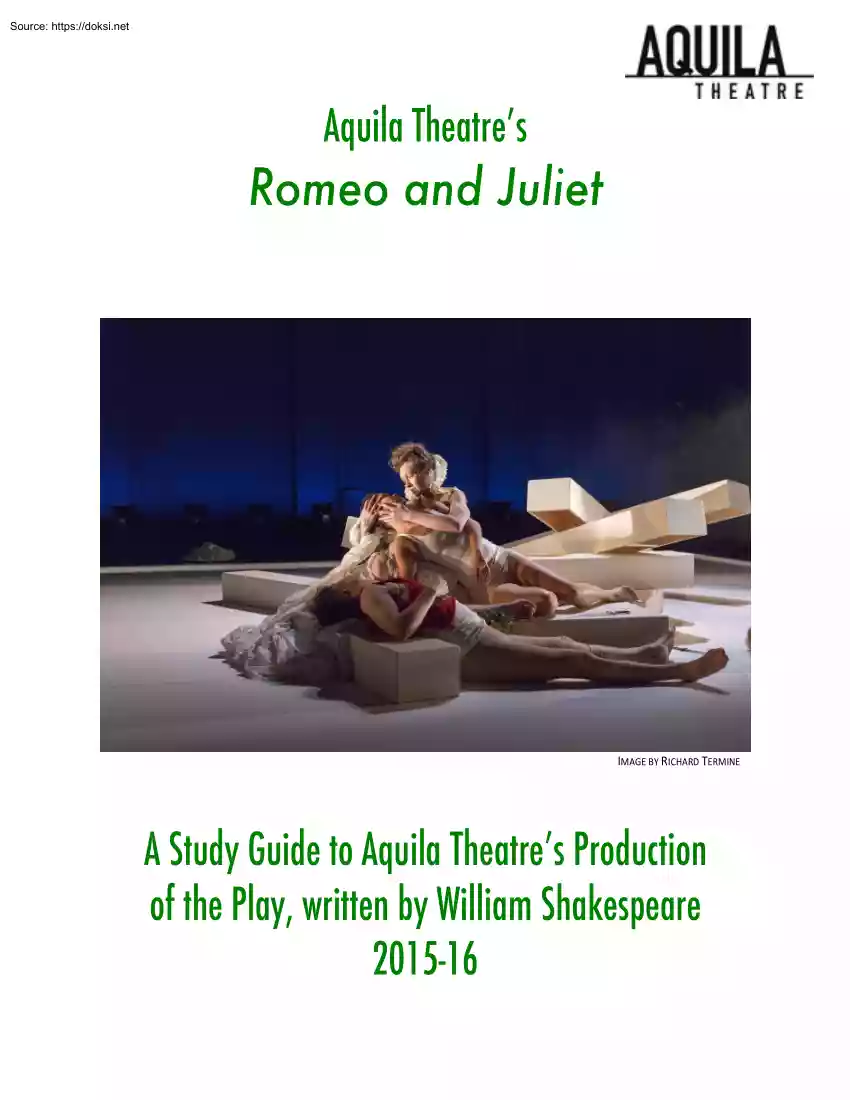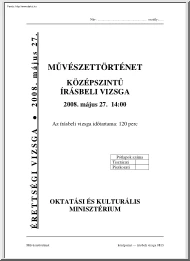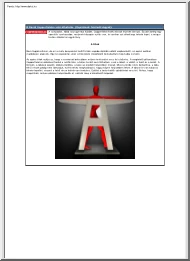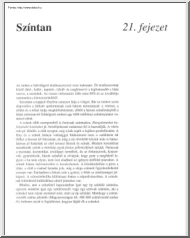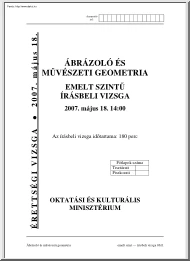Datasheet
Year, pagecount:2016, 8 page(s)
Language:English
Downloads:3
Uploaded:November 29, 2021
Size:11 MB
Institution:
-
Comments:
Attachment:-
Download in PDF:Please log in!
Comments
No comments yet. You can be the first!Content extract
Aquila Theatre’s Romeo and Juliet A Study Guide to Aquila Theatre’s Production of the Play, written by William Shakespeare 2015-16 Synopsis Prologue: The people of Verona feud with each other and are stopped by a decree from the Prince. Act I: Mercutio listens to his lovesick friend Romeo pine after Rosaline. Lady Capulet and Paris discuss whether Juliet, Lady Capulet’s daughter, is old enough to be married. Lady Capulet then invites Paris to a Ball so that he may court Juliet. Romeo and Mercutio find an invitation to the very same Ball, which is being hosted by the Capulets, enemies of Romeo’s family. Mercutio decides they should crash the party so that Romeo can meet other females, and convinces a reluctant Romeo to attend. Juliet’s mother offers Paris as a match to her daughter and a hesitant Juliet agrees to follow her mother’s wishes. Upon arrival at the ball, Romeo and Juliet immediately fall in love, throwing a wrench in Lady Capulet and Paris’ plans. Tybalt,
discovering that Romeo has crashed the party, wants to kill him, but Lady Capulet stops Tybalt for the sake of the Ball. Romeo and Mercutio make their exit before trouble sets in. While Mercutio searches for his friend Romeo, Romeo and Juliet secretly meet at her balcony. They agree to set aside their family names for their love and be married quickly. Romeo asks Friar Lawrence to perform the ceremony and he agrees to help in hopes that it might end the feud between the two families. Romeo tells Mercutio that he is in love, but not with Rosaline. Romeo meets with the Nurse to ask her to send Juliet to him the following day, and the Nurse returns to Juliet and reluctantly tells her of Romeo’s plan for their marriage. The following morning, Romeo and Juliet meet with Friar Laurence and set off to be married. Mercutio and Tybalt fight in the streets Romeo attempts to intervene, but Mercutio is slain. Romeo then attacks and kills Tybalt Act II: Juliet is preparing to meet with Romeo when
the Nurse tells her that Tybalt is dead and Romeo banished as punishment. Deeply upset, Juliet passes her ring to the Nurse, and asks her to deliver it along with a message to Romeo, asking him to meet before he leaves. The Nurse speaks with Romeo and passes him Juliet’s ring and message. Paris attempts to visit Juliet, but she won’t come out of her bedchamber. In Juliet’s absence, Lady Capulet settles that Paris and Juliet will be married in a few days’ time. Lady Capulet informs Juliet that she will be married to Paris and Juliet refuses. Enraged, Lady Capulet tells Juliet to wed Paris or never come home again. Juliet decides to visit Friar Laurence for confession and absolution Meanwhile, Paris visits Friar Laurence to discuss his upcoming wedding to Juliet. When Juliet arrives at the Friar’s, their paths cross and Paris confronts her. After Paris leaves, she begs the Friar to stop her wedding with Paris. Friar Laurence gives her a very strong sleep potion and tells her to
drink it later when she’s alone. Juliet returns home and apologizes to Lady Capulet and bids her tell Paris that she is happy to be wed. Juliet then retires to her room to sleep, where she takes the Friar’s potion and falls onto her bed. Early the following morning, the Nurse goes to fetch Juliet but finds what she presumes to be Juliet’s corpse. Lady Capulet is called up to behold the dead body of her daughter and Paris arrives to the scene and discovers his marriage is not to be. Romeo, banished and in Mantua, learns that Juliet is dead and vows to return so that he may see her again. He buys a potent poison from the Apothecary before leaving for Verona and for his beloved Juliet. Later, Paris sneaks into the Capulet’s monument so he can see Juliet’s body. Rome discovers Paris in the monument. They fight and Paris is killed Romeo reunites with the deeply slumbering Juliet. Presuming that she is dead, he drinks his poison so he may die alongside his beloved Juliet wakes
from her sleep. Friar Laurence, running in, bids her run away with him so she may escape arrest for Romeo and Paris’ deaths. Juliet sends Friar Laurence away and stabs herself with a dagger, dying alongside Romeo. Lady Capulet finds Paris, Romeo and Juliet dead She sits and embraces Romeo and Juliet together. Cast of Characters Ju liet – A thirteen year old girl. Daughter of Lady Capulet and member of the Capulet family. Her closest confidante is the Nurse. Pa ris – A kinsman of the Prince and Lady Capulet’s preferred suitor for Juliet. Nu rse – Juliet’s nurse and caregiver, and the woman who nursed Juliet from the time she was an infant. Tybalt - A Capulet and Lady Capulet’s brother. He loathes Montagues and longs for a fight. Ro meo – The teenaged son and heir of Montague and Lady Montague. He lives in the middle of the violence between the Capulet and Montague family but has no interest in participating. He is emotional and is deeply in love with Rosaline when we
first meet him. He is a close friend of Mercutio and is also close to Friar Lawrence. Mer cu tio - A kinsman to the Prince and close friend of Romeo’s. Fria r La wr enc e – A Franciscan Friar. Friend and confidante to Romeo and Juliet, as well as to Lady Capulet. He is a holy man, and also an expert in using herbs for medicinal purposes. VOCABULARY Shakespearean Insults and Curses See if you can find these curses and insults from The Tempest: The devil take your fingers. A plague upon this howling! A pox on your throat. You bawling, blasphemous, incharitable dog. Thou liest like a dog. The liest thou jesting monkey. Thou art a shallow monster. Filth as thou art. Thy breath is like a rotten lung. Thou art nothing better than a disease. May the south-west wind blister you. Tonight thou shall have cramps and side-stitches. ABHOR – STOP AND THINK: Take%a%moment%to%list%all%of%the%Shakespeare%plays%you%have%read,%
seen%or%even%heard%of.%%If%you%wanted%to%group%these%plays,%how% would%you%do%it?%%By%story?%%By%time%period?%%Are%they%happy%or% sad?%%Do%terrible%things%happen?%%Are%they%about%famous%people?% Think%about%plays%you%know%well.%%Try%to%group%them%in%ways%that% make%sense%to%you.%%% S HAKESPEARE ’ S G ENRES All#of#Shakespeare’s#plays#can#be#organized#into#genres:#Tragedies,#Comedies#and#Histories.## Each#of#these#genres#has#specific#characteristics.# Tragedies:##Tragedies#have#serious#themes.##They#typically#feature#a#hero#with#a#fatal# flaw.#The#hero#often#has#high#social#status,#for#example,#a#nobleman##Deaths#occur## Famous#Tragedies:#Macbeth,#Hamlet#and#Juliet.Ceasar# Comedies:##Shakespeare’s#comedies#often#have#funny#language,#outrageous#plot#twists,# and#mistaken#identities.#Romance#is#often#featured,#but#with#some#kind#of#obstacle#that# needs#to#be#overcome.##Sex#roles#may#be#reversed#in#cases#of#mistaken#identities##They#
often#end#with#some#kind#of#wedding#or#reunion.##Famous#Comedies:#TwelfthNight,As You.LikeIt,#MerchantofVenice# Histories:#Feature#real#historical#figures#and#relate#to#the#current#events#of# Shakespeare’s#time.##Famous#Histories:#HenryV,#RichardIII# In#looking#back#at#your#groupings#and#thinking#about#these#genres,#did#your#groupings# match?##If#so,#how,#and#if#not,#how#were#they#different?##Think#about#the#story#of#Romeo.and Juliet.##What#genre#does#it#belong#in?#Comedy#or#Tragedy?##While#it#does#have#a#wedding,#and# a#romance#with#an#obstacle#as#well#as#funny#word#play,#in#the#middle#of#the#action#the#play# takes#a#very#dark#turn.##That#change#in#genre,#or#play#on#our#expectations,#marks#the#play#as# a#Tragedy#and,#in#fact,#amplifies#the#tragic#nature#of#the#story#for#theatregoers.### # A%crossAdressing%Viola%in%the%film,% Shakespeare)in)Love)(Miramax,%1998)% S DISCUSSION QUESTIONS: 1) What is the definition of “star crossed lovers”? Why are Romeo and Juliet “star
crossed lovers”? Brainstorm a list of other stories involving “star crossed lovers” including stories from other books, movies, plays, anime, manga and graphic novels. How do these stories resolve? How similar are they to Shakespeare’s “Romeo an Juliet”? 2) Different characters have their own moral compass. Lay out the position for each of the following characters: Romeo, Juliet, Lady Capulet, The Friar, Mercutio and Tybalt. Who is the most moral person in the story and why? Think about Lady Capulet and the Friar. Do you think that these two characters have special responsibilities to the young people in their charge? What kind of job do you think they do in advising and guiding Juliet and Romeo? 3) Various cultures have used arranged marriages over the course of history. What were the rules for marriage during the 14th Century? Do you think that the marriage of Juliet to Paris counts as an arranged marriage? Why do you think Juliet’s parents would have wanted to see her
married to someone like Paris? 4) What is the purpose of the Prologue? How does it impact the experience of the reader/theatregoer? 5) Does fate play a role in bringing Romeo and Juliet together? Look back at the beginning of the play and see what references to fate you can find. Follow up Activities 1) Set up a mock talk show where the Montagues and the Capulets come to tell their story. Write a script in which they each plead tell their story and possibly argue. Would there be any reconciliation If so, who would reconcile with whom? 2) Create a list of characteristics you think you would like to see in your ideal mate. Now, try to step into your parents’ shoes. Create a similar list for your ideal mate, but from your parents’ perspectives. How do the lists differ? 3) Break into groups. Write your own alternative ending to Romeo and Juliet, beginning with the moment when Romeo enters the tomb. Perform them for the class. 4) Social media for Romeo & Juliet. Write a twitter
campaign for the Montagues and the Capulets. Create Facebook pages with posts which follow the storyline for Romeo and Juliet. &% % & & %% About % & & & Aquila has performed in over 47 states, including off-Broadway in New York City and at international festivals. The Aquila The atre Com pany w as foun de d in L ond on in 1991 b y Pete r M eineck a nd ha s b een ba se d in N ew York City since 19 99. Aq uila p rese nts a reg ula r se as on of p lays in Ne w York, at in terna tional festivals and tours to approximately seventy American towns and cities a year. The name “Aquila” means “eagle” in Latin. Aquila ha s a very particula r m ission to m ake cla ssica l thea tre a cce ssible an d releva nt to everyone . Peter Mein eck m an ages to m odern iz e pla ys w hile ke epin g true to the sp irit of the orig ina l text. Encoun ters with works of a rt ca n ch ange p eop le, ca using them to view the a rtwork a nd the w orld in a n ew w a y. In a dd
ition, a rtw orks d o n ot imm e dia tely revea l all tha t is there to b e s een . Perception of artworks can be compared to peeling the layers of an onion – they can be seen on many levels and from many perspectives. & THE%WHITE%HOUSE% THE%SUPREME%COURT% FOLGER%SHAKESPEARE%LIBRARY,%WASHINGTON%DC% LA%JOLLA%PLAYHOUSE% SHAKESPEARE%FESTIVAL/LA% BROOKLYN%ACADEMY%OF%MUSIC% NYU%SKIRBALL%CENTER% LUCILLE%LORTEL%THEATRE% BARUCH%PERFORMING%ARTS%CENTER% NEW%VICTORY%THEATER% EAST%13TH%STREET%THEATRE% CLURMAN%THEATRE,%THEATRE%ROW% 45%BLEECKER% MANHATTAN%ENSEMBLE%THEATRE% CLARK%STUDIO%THEATRE%AT%LINCOLN%CENTER% SHAKESPEARE%FESTIVAL%IN%GLOBE%NEUSS,%GERMANY% EDINBURGH%FESTIVAL,%UK% FESTIVAL%OF%THE%AEGEAN,%GREECE% THE%BERMUDA%FESTIVAL% SHAKESPEARE%FESTIVAL,%GYULA,%HUNGARY% SHAKESPEARE%FESTIVAL%IN%GDANSK,%POLAND& & MACBETH% 1996& % CORIOLANUS% 1994$1995& % KING%LEAR% 1999$2000& % THE%TEMPEST% 2001$2002& % A %MIDSUMMER%NIGHT’S%DREAM% 2003& %
THE%MAN%WHO%WOULD%BE%KING% 2003$2004& % THE%INVISIBLE%MAN% 2005& % HAMLET% 2005$2006& % M UCH%ADO%ABOUT%% NOTHING% 2006& & & ROMEO%&%JULIET% 2006$2007& % % CATCH/22% 2007$2008& % ILIAD:%BOOK%I% 2008$2009& % AS%YOU%LIKE%IT% 2009$2010& % A%MIDSUMMER%NIGHT’S%% DREAM% 2010$2011& % MACBETH%/%THE%IMPORTANCE%OF% BEING%EARNEST% 2011$2012& % TAMING%OF%THE%SHREW%/% CYRANO%DE%B ERGERAC% 2012$2013& & TWELFTH%NIGHT/% FAHRENHEIT%451% 2013$2014& The Aqu ila Th ea tre C ompa ny 100 Washington Sq. East, 503 Silver New York, NY 10003 Telephone – 914-401-9494 Fax – 914-401-9493 Email – aquila@aquilatheatre.com Website – www.aquilatheatrecom Or “like” us on Facebook
discovering that Romeo has crashed the party, wants to kill him, but Lady Capulet stops Tybalt for the sake of the Ball. Romeo and Mercutio make their exit before trouble sets in. While Mercutio searches for his friend Romeo, Romeo and Juliet secretly meet at her balcony. They agree to set aside their family names for their love and be married quickly. Romeo asks Friar Lawrence to perform the ceremony and he agrees to help in hopes that it might end the feud between the two families. Romeo tells Mercutio that he is in love, but not with Rosaline. Romeo meets with the Nurse to ask her to send Juliet to him the following day, and the Nurse returns to Juliet and reluctantly tells her of Romeo’s plan for their marriage. The following morning, Romeo and Juliet meet with Friar Laurence and set off to be married. Mercutio and Tybalt fight in the streets Romeo attempts to intervene, but Mercutio is slain. Romeo then attacks and kills Tybalt Act II: Juliet is preparing to meet with Romeo when
the Nurse tells her that Tybalt is dead and Romeo banished as punishment. Deeply upset, Juliet passes her ring to the Nurse, and asks her to deliver it along with a message to Romeo, asking him to meet before he leaves. The Nurse speaks with Romeo and passes him Juliet’s ring and message. Paris attempts to visit Juliet, but she won’t come out of her bedchamber. In Juliet’s absence, Lady Capulet settles that Paris and Juliet will be married in a few days’ time. Lady Capulet informs Juliet that she will be married to Paris and Juliet refuses. Enraged, Lady Capulet tells Juliet to wed Paris or never come home again. Juliet decides to visit Friar Laurence for confession and absolution Meanwhile, Paris visits Friar Laurence to discuss his upcoming wedding to Juliet. When Juliet arrives at the Friar’s, their paths cross and Paris confronts her. After Paris leaves, she begs the Friar to stop her wedding with Paris. Friar Laurence gives her a very strong sleep potion and tells her to
drink it later when she’s alone. Juliet returns home and apologizes to Lady Capulet and bids her tell Paris that she is happy to be wed. Juliet then retires to her room to sleep, where she takes the Friar’s potion and falls onto her bed. Early the following morning, the Nurse goes to fetch Juliet but finds what she presumes to be Juliet’s corpse. Lady Capulet is called up to behold the dead body of her daughter and Paris arrives to the scene and discovers his marriage is not to be. Romeo, banished and in Mantua, learns that Juliet is dead and vows to return so that he may see her again. He buys a potent poison from the Apothecary before leaving for Verona and for his beloved Juliet. Later, Paris sneaks into the Capulet’s monument so he can see Juliet’s body. Rome discovers Paris in the monument. They fight and Paris is killed Romeo reunites with the deeply slumbering Juliet. Presuming that she is dead, he drinks his poison so he may die alongside his beloved Juliet wakes
from her sleep. Friar Laurence, running in, bids her run away with him so she may escape arrest for Romeo and Paris’ deaths. Juliet sends Friar Laurence away and stabs herself with a dagger, dying alongside Romeo. Lady Capulet finds Paris, Romeo and Juliet dead She sits and embraces Romeo and Juliet together. Cast of Characters Ju liet – A thirteen year old girl. Daughter of Lady Capulet and member of the Capulet family. Her closest confidante is the Nurse. Pa ris – A kinsman of the Prince and Lady Capulet’s preferred suitor for Juliet. Nu rse – Juliet’s nurse and caregiver, and the woman who nursed Juliet from the time she was an infant. Tybalt - A Capulet and Lady Capulet’s brother. He loathes Montagues and longs for a fight. Ro meo – The teenaged son and heir of Montague and Lady Montague. He lives in the middle of the violence between the Capulet and Montague family but has no interest in participating. He is emotional and is deeply in love with Rosaline when we
first meet him. He is a close friend of Mercutio and is also close to Friar Lawrence. Mer cu tio - A kinsman to the Prince and close friend of Romeo’s. Fria r La wr enc e – A Franciscan Friar. Friend and confidante to Romeo and Juliet, as well as to Lady Capulet. He is a holy man, and also an expert in using herbs for medicinal purposes. VOCABULARY Shakespearean Insults and Curses See if you can find these curses and insults from The Tempest: The devil take your fingers. A plague upon this howling! A pox on your throat. You bawling, blasphemous, incharitable dog. Thou liest like a dog. The liest thou jesting monkey. Thou art a shallow monster. Filth as thou art. Thy breath is like a rotten lung. Thou art nothing better than a disease. May the south-west wind blister you. Tonight thou shall have cramps and side-stitches. ABHOR – STOP AND THINK: Take%a%moment%to%list%all%of%the%Shakespeare%plays%you%have%read,%
seen%or%even%heard%of.%%If%you%wanted%to%group%these%plays,%how% would%you%do%it?%%By%story?%%By%time%period?%%Are%they%happy%or% sad?%%Do%terrible%things%happen?%%Are%they%about%famous%people?% Think%about%plays%you%know%well.%%Try%to%group%them%in%ways%that% make%sense%to%you.%%% S HAKESPEARE ’ S G ENRES All#of#Shakespeare’s#plays#can#be#organized#into#genres:#Tragedies,#Comedies#and#Histories.## Each#of#these#genres#has#specific#characteristics.# Tragedies:##Tragedies#have#serious#themes.##They#typically#feature#a#hero#with#a#fatal# flaw.#The#hero#often#has#high#social#status,#for#example,#a#nobleman##Deaths#occur## Famous#Tragedies:#Macbeth,#Hamlet#and#Juliet.Ceasar# Comedies:##Shakespeare’s#comedies#often#have#funny#language,#outrageous#plot#twists,# and#mistaken#identities.#Romance#is#often#featured,#but#with#some#kind#of#obstacle#that# needs#to#be#overcome.##Sex#roles#may#be#reversed#in#cases#of#mistaken#identities##They#
often#end#with#some#kind#of#wedding#or#reunion.##Famous#Comedies:#TwelfthNight,As You.LikeIt,#MerchantofVenice# Histories:#Feature#real#historical#figures#and#relate#to#the#current#events#of# Shakespeare’s#time.##Famous#Histories:#HenryV,#RichardIII# In#looking#back#at#your#groupings#and#thinking#about#these#genres,#did#your#groupings# match?##If#so,#how,#and#if#not,#how#were#they#different?##Think#about#the#story#of#Romeo.and Juliet.##What#genre#does#it#belong#in?#Comedy#or#Tragedy?##While#it#does#have#a#wedding,#and# a#romance#with#an#obstacle#as#well#as#funny#word#play,#in#the#middle#of#the#action#the#play# takes#a#very#dark#turn.##That#change#in#genre,#or#play#on#our#expectations,#marks#the#play#as# a#Tragedy#and,#in#fact,#amplifies#the#tragic#nature#of#the#story#for#theatregoers.### # A%crossAdressing%Viola%in%the%film,% Shakespeare)in)Love)(Miramax,%1998)% S DISCUSSION QUESTIONS: 1) What is the definition of “star crossed lovers”? Why are Romeo and Juliet “star
crossed lovers”? Brainstorm a list of other stories involving “star crossed lovers” including stories from other books, movies, plays, anime, manga and graphic novels. How do these stories resolve? How similar are they to Shakespeare’s “Romeo an Juliet”? 2) Different characters have their own moral compass. Lay out the position for each of the following characters: Romeo, Juliet, Lady Capulet, The Friar, Mercutio and Tybalt. Who is the most moral person in the story and why? Think about Lady Capulet and the Friar. Do you think that these two characters have special responsibilities to the young people in their charge? What kind of job do you think they do in advising and guiding Juliet and Romeo? 3) Various cultures have used arranged marriages over the course of history. What were the rules for marriage during the 14th Century? Do you think that the marriage of Juliet to Paris counts as an arranged marriage? Why do you think Juliet’s parents would have wanted to see her
married to someone like Paris? 4) What is the purpose of the Prologue? How does it impact the experience of the reader/theatregoer? 5) Does fate play a role in bringing Romeo and Juliet together? Look back at the beginning of the play and see what references to fate you can find. Follow up Activities 1) Set up a mock talk show where the Montagues and the Capulets come to tell their story. Write a script in which they each plead tell their story and possibly argue. Would there be any reconciliation If so, who would reconcile with whom? 2) Create a list of characteristics you think you would like to see in your ideal mate. Now, try to step into your parents’ shoes. Create a similar list for your ideal mate, but from your parents’ perspectives. How do the lists differ? 3) Break into groups. Write your own alternative ending to Romeo and Juliet, beginning with the moment when Romeo enters the tomb. Perform them for the class. 4) Social media for Romeo & Juliet. Write a twitter
campaign for the Montagues and the Capulets. Create Facebook pages with posts which follow the storyline for Romeo and Juliet. &% % & & %% About % & & & Aquila has performed in over 47 states, including off-Broadway in New York City and at international festivals. The Aquila The atre Com pany w as foun de d in L ond on in 1991 b y Pete r M eineck a nd ha s b een ba se d in N ew York City since 19 99. Aq uila p rese nts a reg ula r se as on of p lays in Ne w York, at in terna tional festivals and tours to approximately seventy American towns and cities a year. The name “Aquila” means “eagle” in Latin. Aquila ha s a very particula r m ission to m ake cla ssica l thea tre a cce ssible an d releva nt to everyone . Peter Mein eck m an ages to m odern iz e pla ys w hile ke epin g true to the sp irit of the orig ina l text. Encoun ters with works of a rt ca n ch ange p eop le, ca using them to view the a rtwork a nd the w orld in a n ew w a y. In a dd
ition, a rtw orks d o n ot imm e dia tely revea l all tha t is there to b e s een . Perception of artworks can be compared to peeling the layers of an onion – they can be seen on many levels and from many perspectives. & THE%WHITE%HOUSE% THE%SUPREME%COURT% FOLGER%SHAKESPEARE%LIBRARY,%WASHINGTON%DC% LA%JOLLA%PLAYHOUSE% SHAKESPEARE%FESTIVAL/LA% BROOKLYN%ACADEMY%OF%MUSIC% NYU%SKIRBALL%CENTER% LUCILLE%LORTEL%THEATRE% BARUCH%PERFORMING%ARTS%CENTER% NEW%VICTORY%THEATER% EAST%13TH%STREET%THEATRE% CLURMAN%THEATRE,%THEATRE%ROW% 45%BLEECKER% MANHATTAN%ENSEMBLE%THEATRE% CLARK%STUDIO%THEATRE%AT%LINCOLN%CENTER% SHAKESPEARE%FESTIVAL%IN%GLOBE%NEUSS,%GERMANY% EDINBURGH%FESTIVAL,%UK% FESTIVAL%OF%THE%AEGEAN,%GREECE% THE%BERMUDA%FESTIVAL% SHAKESPEARE%FESTIVAL,%GYULA,%HUNGARY% SHAKESPEARE%FESTIVAL%IN%GDANSK,%POLAND& & MACBETH% 1996& % CORIOLANUS% 1994$1995& % KING%LEAR% 1999$2000& % THE%TEMPEST% 2001$2002& % A %MIDSUMMER%NIGHT’S%DREAM% 2003& %
THE%MAN%WHO%WOULD%BE%KING% 2003$2004& % THE%INVISIBLE%MAN% 2005& % HAMLET% 2005$2006& % M UCH%ADO%ABOUT%% NOTHING% 2006& & & ROMEO%&%JULIET% 2006$2007& % % CATCH/22% 2007$2008& % ILIAD:%BOOK%I% 2008$2009& % AS%YOU%LIKE%IT% 2009$2010& % A%MIDSUMMER%NIGHT’S%% DREAM% 2010$2011& % MACBETH%/%THE%IMPORTANCE%OF% BEING%EARNEST% 2011$2012& % TAMING%OF%THE%SHREW%/% CYRANO%DE%B ERGERAC% 2012$2013& & TWELFTH%NIGHT/% FAHRENHEIT%451% 2013$2014& The Aqu ila Th ea tre C ompa ny 100 Washington Sq. East, 503 Silver New York, NY 10003 Telephone – 914-401-9494 Fax – 914-401-9493 Email – aquila@aquilatheatre.com Website – www.aquilatheatrecom Or “like” us on Facebook
